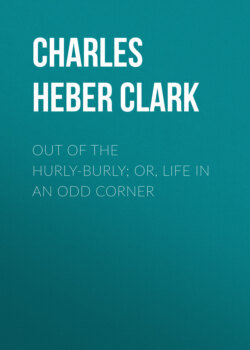Читать книгу Out of the Hurly-Burly; Or, Life in an Odd Corner - Charles Heber Clark - Страница 9
NEW CASTLE FROM THE RIVER.
ОглавлениеEvery man is something of a hero-worshiper; and if in the city I find it difficult to select an idol from among the many who thrust their greatness upon me, I am not so embarrassed in the village. Here I will probably find but one man who is revered as the embodiment of the worshipful virtues. He has larger wealth than any of his fellow-villagers; he lives in the most sumptuous house in the place; he belongs to the oldest family, and his claim to superiority is admitted almost without question by his reverent townsmen. It gives me joy to add my voice to the chorus of admiration, and to feel humble in that presence wherein my neighbors have humility. Sometimes, of course, I cannot help perceiving that the object of this adoration is, after all, a very pigmy of his kind. I am compelled to admit that his fortune seems large only because mine and Jones's are small; that his house is a palace only for the reason that it dwarfs my little cottage; that if unassisted brains carried the day, and strutting was felonious, he would certainly occupy a much less magnificent position. I know that in a greater community he would be wholly insignificant. And yet I admit his claim to profound respect. It pleases me to see him play his little part, and to observe with what calm, luxurious confidence in his own right and title to homage he passes through life. And I know, after all, that the greater men, out in the busy hurly-burly of the world, are not so very much greater. A good deal of their claim to superiority, too, is a miserable sham; and doubtless, if we could see them as closely as we see our village grandee, we should find that they also depend much upon popular credulity for the stability of their reputations.
My pompous village nabob, too, is honest. I am sure of this. He helps to conduct the government of the community, but he does his duty fairly and he is a gentleman. I could love him for that alone, and for that feel a deeper affection for life in his village. When I go to the city and perceive what creatures wield the power there, when I watch the trickery, the iniquity, the audacious infamy, of the cliques that control the machinery of that great government, and when I look, as I do sometimes, into the faces of those who are thus leagued for plunder and power, only to see there vulgarity, ignorance, vice and general moral filthiness, my soul is made sick. I can turn then with pleasure to the simple methods with which our village is governed, and honestly give my respect to the guileless old gentleman who presides over its destinies.
We wish for quietness, and in New Castle it can be obtained, I think, in a particularly concentrated form. When Swede and Dutchman and Englishman had done contending for possession of the place, there was peace until the Revolution came, and with it ships of war and privateers, and such hurrying of troops and supplies across from New Castle to Frenchtown, from the Delaware to the Chesapeake, as kept the old town in a stir. There was then an interval of repose until the second war with England, when these busy scenes were re-enacted. Later in the century a mighty stir was made by the construction of a railroad, one of the earliest in the country, to Chesapeake Bay; then, as the excitement died away, the old town gradually went to sleep, and for nearly forty years it slumbered so soundly that there seemed to be a chance that it would never wake again. But time achieves wonderful things, and perhaps the day will come when the vicinity of the old town to the bay, the depth of water at its shores and the facilities offered for manufacturing and easy transportation, may make the village a great industrial centre, with hundreds of mills and multitudes of working-people. But as we join ourselves to the community there is no promise of such an awakening. We have still the profound repose and the absence of change that make the place so dear to those who have known it in their childhood. There are the paved streets where the grass grows thickly; the ancient wharves protruding into the stream, deserted but by the anglers and the naked and wicked little boys who go in to swim; the tumbling stone ice-piers, a little way out in the river; the old court-house, whose steeple is the point upon which moves the twelve-mile radial line whose northern end describes the semi-circular boundary of Delaware; the rickety town-hall, the ancient churches and the grim old houses with moss-covered roofs, the Battery, with its drooping willows and its glorious vista of river and shore beyond, and the dense masses of foliage, shutting out the sky here and there as one passes along the streets.
Into such a house as I have described, not far from the river, and with our neighbors at a little more than arm's length, I have come with wife and family, with household gods and domestic paraphernalia generally, to begin the life which will supply the material wherewith to construct the ensuing pages. It may perhaps turn out that the better part of that existence will not be told, but perchance it may be that the events related will be those which will possess for the reader greatest interest and amusement.
